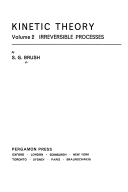Uniformity, Non-Uniformity, and Irreversibility
We must make the following remark: a proof, that after a certain time t1, the spheres must necessarily be mixed uniformly, whatever may be the initial distribution of states, cannot be given. This is in fact a consequence of probability theory, for any non-uniform distribution of states, no matter how improbable it may be, is still not absolutely impossible. Indeed it is clear that any individual uniform distribution, which might arise after a certain time from some particular initial state, is just as improbable as an individual non-uniform distribution; just as in the game of Lotto, any individual set of five numbers is as improbable as the set 1, 2, 3, 4, 5. It is only because there are many more uniform distributions than non-uniform ones that the distribution of states will become uniform in the course of time. One therefore cannot prove that, whatever may be the positions and velocities of the spheres at the beginning, the distributions must become uniform after a long time; rather one can only prove that infinitely many more initial states will lead to a uniform one after a definite length of time than to a non-uniform one. Loschmidt's theorem tells us only about initial states which actually lead to a very non-uniform distribution of states after a certain time t1; but it does not prove that there are not infinitely many more initial conditions that will lead to a uniform distribution after the same time. On the contrary, it follows from the theorem itself that, since there are infinitely many more uniform distributions, the number of states which lead to uniform distributions after a certain time t1, is much greater than the number that leads to non-uniform ones, and the latter are the ones that must be chosen, according to Loschmidt, in order to obtain a non-uniform distribution at t1.
Notes:
A heavy passage from Ludwig Eduard Boltzmann on the probability of non-uniform states.
Folksonomies: thermodynamics
Taxonomies:
/science/mathematics/statistics (0.197225)
/law, govt and politics/legal issues/legislation/building laws (0.156120)
/law, govt and politics/government (0.124331)
Keywords:
non-uniform distribution (0.959522 (negative:-0.405587)), certain time (0.786361 (neutral:0.000000)), individual non-uniform distribution (0.671732 (negative:-0.453195)), non-uniform ones (0.632868 (positive:0.002809)), non-uniform states (0.578316 (negative:-0.374647)), certain time t1 (0.545261 (neutral:0.000000)), individual uniform distribution (0.543192 (positive:0.349581)), Ludwig Eduard Boltzmann (0.539636 (negative:-0.374647)), uniform distributions (0.530225 (negative:-0.235437)), particular initial state (0.509589 (neutral:0.000000)), initial states (0.413281 (negative:-0.344947)), initial distribution (0.345922 (neutral:0.000000)), heavy passage (0.329223 (negative:-0.374647)), initial conditions (0.325738 (negative:-0.492062)), following remark (0.323130 (neutral:0.000000)), probability theory (0.309023 (negative:-0.321370)), definite length (0.297615 (negative:-0.344947)), long time (0.277622 (neutral:0.000000)), individual set (0.275372 (neutral:0.000000)), Loschmidt (0.214004 (positive:0.309187)), spheres (0.204350 (negative:-0.240943))
Entities:
Loschmidt:Person (0.794477 (positive:0.309187)), Ludwig Eduard Boltzmann:Person (0.753989 (negative:-0.374647))
Concepts:
Mathematics (0.986980): dbpedia | freebase | opencyc
Statistical mechanics (0.803194): dbpedia | freebase | opencyc
Ludwig Boltzmann (0.775974): dbpedia | freebase | yago
Probability theory (0.762287): dbpedia | freebase | opencyc
University of Vienna (0.706065): geo | website | dbpedia | freebase | yago
Probability density function (0.694495): dbpedia | freebase | yago
Number (0.659673): dbpedia | freebase
Normal distribution (0.659042): dbpedia | freebase





